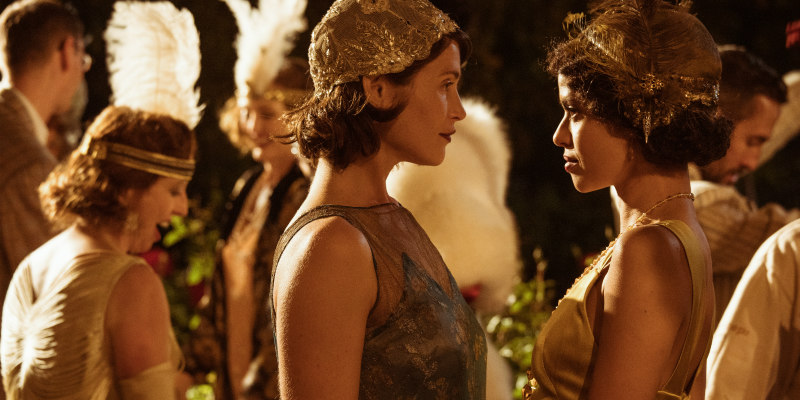
In WWII England, a reclusive folklorist's life is upended by the arrival of a young boy evacuated from Blitz ravaged London.
Review by Eric Hillis
Directed by: Jessica Swale
Starring: Gemma Arterton, Gugu Mbatha-Raw, Tom Courtenay, Penelope Wilton, Lucas Bond, Dixie Egerickx

Award-winning British playwright and theatre director Jessica Swale's cinematic debut Summerland is at once three different movies. It's a movie about a grouchy recluse having their icy facade melted away by the innocence of a child; it's a movie about an inter-racial and same-sex romance doomed by society's disapproval; and it's a movie about the nature of myths and folklore, and where stories come from. It only really works as the first of the three, as the middle subplot is superficially shoehorned into a piece of unchallenging middlebrow British cinema, while the latter element is barely touched upon.
We first encounter our protagonist, folklorist Alice Lamb, at some point in the 1970s. Played by Penelope Wilton, she tells a pair of kids to bugger off before we're taken back to WWII era rural England, where Alice is now portrayed by Gemma Arterton, but just as grouchy. A clumsily edited montage details her morning trip to her village, where she offends several locals and is mocked by children before returning to her secluded home where she spends her days alone studying the origins of folklore. Far from subtle, these opening moments paint a picture of Alice as a witch from a Roald Dahl book.

Alice's routine is disturbed by the arrival of a London evacuee, a young boy named Frank (Lucas Bond), who has been entrusted into her care (she missed the letter notifying her of this inconvenience because her letterbox had been clogged by kids who filled it with dirt). Upon protesting, Alice is told that she must look after the boy for at least a week before she can pawn him off on some more accommodating household. While the boy's presence initially disturbs Alice, it's no surprise that she comes to warm to him. The two bond over folklore, and through Frank's wide-eyed sense of wonder, she begins to see the stories she studies in a new light, one not so grounded in rationale.
[ READ MORE: New Release Review - Proxima ]
Frank's innocent interrogations of Alice regarding her lack of a husband stir up suppressed memories of a romance she enjoyed while in college. Alice fell in love with another young woman, Vera (Gugu Mbatha-Raw), who like Frank, was a free spirit who opened Alice's heart to new experiences. But, this being the 1930s, such a relationship was doomed from the off.

Summerland works best as a middle-of-the-road English riff on Cinema Paradiso, with crusty old compendiums of folk tales standing in for reels of celluloid, and visions of castles in the sky replacing projected images. Arterton and Bond share a delightful chemistry, and the young actor is a genuine find. Equally impressive is another child actor, Dixie Egerickx, who plays a precocious classmate of Frank's. When Summerland simply lets us hang out with this trio it's a lot of fun, as the film is working within its cosy comfort zone.
[ READ MORE: New Release Review - The Traitor ]
It's when Swale's film introduces its lesbian subplot that the problems arise. Reduced to a handful of sun-dappled flashbacks, it simply isn't given the depth of treatment it really requires. The casting of mixed-race actor Mbatha-Raw in the role of Vera is at once both colour blind and tone deaf. I have to assume the part was originally written as white, as the subject of race is never once mentioned. As a result, the film appears to take place in an alternate vision of 1930s Britain where same-sex relationships are shunned but racism doesn't exist. Were young mixed-race women able to traverse middle class British society as comfortably as Vera does here? My guess is a resounding No. From what I know of the circles Alice and Vera were running in, I suspect a lesbian relationship wouldn't have been half as scandalous as an inter-racial coupling. Yet when Vera discusses her fears with Alice, she talks about how society would react to them as same-sex lovers, with no mention of any racial issues. It's baffling that a movie so concerned with one form of prejudice could be so entirely dismissive of another.

In its final act, following a plot twist that you'll have seen coming if you paid attention to the nature of the casting, Summerland turns into a melodramatic mess, piling one overblown piece of drama on top of another. There's a fire, there's a near drowning, there's a seemingly supernatural occurrence; all rushed through with no time for any of it to have the required impact.
Like so many middlebrow British movies, Summerland is all surface. It's ironic that it deals with repression, because the movie itself seems afraid to explore its themes in any great depth, as though careful not to offend any audience members. It doesn't seem to have thought about the implications of some of its plot elements, and it's hoping you won't either.

Summerland is in UK cinemas July 31st.
"As an exploration of a certain kind of female experience, Saint Frances is both candid and entertaining."— The Movie Waffler (@themoviewaffler) July 27, 2020
SAINT FRANCES is in UK/ROI cinemas now.
Read @filmclubchs's reviewhttps://t.co/xM5lVidof8 pic.twitter.com/rTwaVUlCYm

